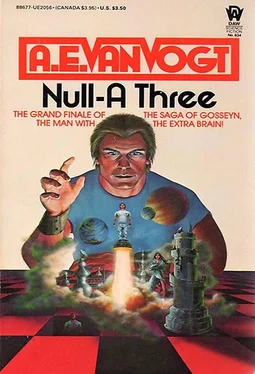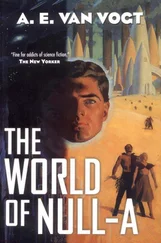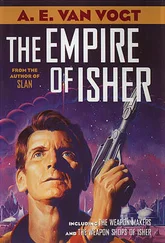Alfred Van Vogt - Null–A Three
Здесь есть возможность читать онлайн «Alfred Van Vogt - Null–A Three» весь текст электронной книги совершенно бесплатно (целиком полную версию без сокращений). В некоторых случаях можно слушать аудио, скачать через торрент в формате fb2 и присутствует краткое содержание. Жанр: Фантастика и фэнтези, на английском языке. Описание произведения, (предисловие) а так же отзывы посетителей доступны на портале библиотеки ЛибКат.
- Название:Null–A Three
- Автор:
- Жанр:
- Год:неизвестен
- ISBN:нет данных
- Рейтинг книги:3 / 5. Голосов: 1
-
Избранное:Добавить в избранное
- Отзывы:
-
Ваша оценка:
- 60
- 1
- 2
- 3
- 4
- 5
Null–A Three: краткое содержание, описание и аннотация
Предлагаем к чтению аннотацию, описание, краткое содержание или предисловие (зависит от того, что написал сам автор книги «Null–A Three»). Если вы не нашли необходимую информацию о книге — напишите в комментариях, мы постараемся отыскать её.
Null-A 3 is destined to become an instant classic — a mind boggling galaxy-spanning adventure!
Null–A Three — читать онлайн бесплатно полную книгу (весь текст) целиком
Ниже представлен текст книги, разбитый по страницам. Система сохранения места последней прочитанной страницы, позволяет с удобством читать онлайн бесплатно книгу «Null–A Three», без необходимости каждый раз заново искать на чём Вы остановились. Поставьте закладку, и сможете в любой момент перейти на страницу, на которой закончили чтение.
Интервал:
Закладка:
Equally obviously, if the emperor was still recoverable, then each man had to establish for the benefit of onlookers that he had manifested sincere concern. Probably of equal importance for the future of these courtiers, whatever developed, there would be another heir, who would later judge these intimates. And the usual tattlers would be busy reporting on the unwary.
For Gosseyn, who had his own problems, the detailed reactions of particular persons didn’t matter. It seemed real to him that his own future would be more secure if the boy was still alive. So he followed a simple rule: the observation of the earlier Gosseyns was that in a crisis the military took over. So—very simply—he kept his attention on the officer who had questioned him: Draydart Duart, whose rank was surely some variation of Top Commander.
As he anticipated, the Draydart recovered quickly from his own initial shock. Whereupon, he turned abruptly, and walked to a section of the wall near the throne chair. Arrived there, he pushed aside the drapery. Touched something on the wall itself. And began to talk.
The precision reaction must have been noticed by others. Because, progressively, silence settled over the room. The elegantly dressed gentlemen-in-waiting ceased their milling and verbalizing at each other.
And so the Draydart’s voice was suddenly audible as he, evidently, concluded his commands: “Act at once! And be very careful!”
With those final admonitions, the officer allowed the draperies to fall back in place. And he turned; and that lean, fortyish face and body headed towards where Gosseyn waited with Four. As he came up, he seemed to address them both, as he said:
“Naturally, our instruments kept track of the capsule. It has now been located, and is in process of being brought aboard once more.”
He added, “A special team of scientists will open it, and escort the emperor to wherever seems best for him.”
He concluded, speaking now directly to Gosseyn, “I’m not sure whether we should have you here when the emperor returns.”
It was interesting to Gosseyn that the Draydart could talk as if concern for the boy, and where he should be taken when he was rescued, should be what was best for him.” Yet in the final comment take it for granted that the destination was automatic return to the throne room.
Presumably, all that would be resolved at the moment of rescue. But actually there was a simple solution to Gosseyn’s own situation. “Why don’t you, he said, “when the time comes, ask his majesty whether he wants me present?”
There was a pause. He was looking at the officers face; and there was visibly an adjustment of thought taking place. In seizing control as he had, the Draydart had manifested total military ascendancy over civilians. Automatically, that attitude had placed the boy, mentally, in a victim category, to be moved and maneuvered for his own good according to the Draydart’s best judgment. Just as the emperor would be not asked if he wished to be rescued, so in the first moments afterwards, he would be treated within the frame of rules and regulations.
The pause ended. “Of course,” acknowledged the super-commander.
It took a while; about twenty minutes. During that time everyone stood, strangely silent, waiting. People seemed to be gazing, not at each other, but off somewhere.
Abruptly, there was the boyish voice again from another hidden ceiling speaker: “Yes, I want that so-and-so to be present. Don’t let him get away!”
Gosseyn decided to assume that the so-and-so referred to was himself. It seemed to him that the emperor’s tone as he spoke the words, didn’t sound very favorable.
As he had that thought, a man’s voice said from the ceiling: “Draydart Duart, check—” The word that followed was unknown to Gosseyn; it sounded like… “rutule.”
What happened: the officer reached quickly to one of the decorations on the left shoulder of his uniform. The small, shiny object that he grasped was something on a chain. The Draydart simply lifted the thing to his left ear. And he seemed to be listening. After only a few seconds he allowed the small, silvery decoration to drop back in place.
As he did so, he turned to the group of courtiers, and said, “We’ve to adjourn to the—” Once again it was a word unknown to Gosseyn. This one sounded like “braid.”
But the basic meaning was obvious. The next interview would be in another room.
Presumably, it was intended to be a location where the prisoner—Gilbert Gosseyn—would be confronted by more defense systems. Gosseyn, recalling how the activity of his extra-brain had already been registered on their instruments twice, had the unhappy feeling that new, protective devices would be available to defend the emperor against anything he might do in that area.
Since, in all this, his overall purpose was to defend himself and, possibly, gain more information, it seemed obvious that the moment when he would have to make some final decision, was upon him.
CHAPTER 5
Since he had no ulterior motives in connection with “his majesty”, Gosseyn decided there was no value in making a 20-decimal mental photograph of any portion of the throne room.
The truth was, if for any reason he ever returned to such a significant area, it would look suspicious to everyone; and no excuse would thereafter be acceptable to the young emperor’s henchman. As of now they felt he could be of use to them in finding out what had caused their fleet to move to an unknown part of space: unknown to them, and, actually, unknown to him. So he had things to learn, also.
The immediate information available was minor. But nonetheless Gosseyn took careful note that he was led from that very throne room along a corridor to an elevator area—there were half a dozen elevators in a row. One of these took him up—he estimated—the equivalent of eight floor levels. Then he was led along another corridor, this one lined with guards in gray uniforms, each of whom drew himself stiffly erect, and made a hand motion, as the Draydart walked by.
The hand motion consisted of each guard placing the right palm on the middle of the chest. Presumably, it was a lower status military salute.
The room they came to, presently, seemed to be more of a social reception area. There were settees and large chairs and tables; and the large group of courtiers, who had crowded into adjoining elevators, and had walked behind Gosseyn and his two guides—Four and the military chieftain—took up standing positions near one or another of the seats.
There seemed to be several other entrances to the big room. From where he had stopped beside the Draydart, Gosseyn could see, off to one side, part of an alcove that undoubtedly led somewhere. And there were three draped doors, one on each wall. That was in addition to the one through which he had arrived.
So here he was, standing with the others… waiting. Gosseyn felt no particular need to pre-plan his response to the second interview. But he felt vaguely unhappy because—what a waste of time! All these men and himself, obviously involved, he in his fashion, they in theirs, in a colossal event, but waiting now for a boy king who could be counted on to cause more problems.
Instants after he had that negative reaction, the boy came at a rapid walk in through the alcove. Surprisingly, moments after entering, the child-emperor came to a teetering halt. And then, as if it were a last moment decision, he walked forward to within a dozen feet of Gosseyn.
In its way, in view of what had happened, it was a brave action. And his bright eyes were equally brave as he stared at the prisoner. Abruptly, his face twisted—“What did you do? What did you do to me?”
It was attack. The voice was high-pitched, outraged, brave. And Gosseyn’s first reaction was: okay, here we go again! Yet, after a moment, he sensed a different level of courage; and, at once, the situation seemed less threatening than… earlier… in the throne room.
Читать дальшеИнтервал:
Закладка:
Похожие книги на «Null–A Three»
Представляем Вашему вниманию похожие книги на «Null–A Three» списком для выбора. Мы отобрали схожую по названию и смыслу литературу в надежде предоставить читателям больше вариантов отыскать новые, интересные, ещё непрочитанные произведения.
Обсуждение, отзывы о книге «Null–A Three» и просто собственные мнения читателей. Оставьте ваши комментарии, напишите, что Вы думаете о произведении, его смысле или главных героях. Укажите что конкретно понравилось, а что нет, и почему Вы так считаете.











